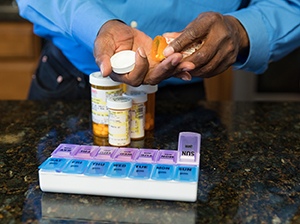Medicines for Cardiomyopathy
Medications for Cardiomyopathy

Common medicines
Your healthcare provider may prescribe one or more of the following:
ACE inhibitors help blood flow more easily by relaxing blood vessels and lowering blood pressure. This lets the heart pump more blood without doing more work. This is especially useful if you also have diabetes because it protects the kidneys from further damage.
Anticoagulants help prevent blood clots, which can occur when blood pools in the heart from impaired pumping. You may need routine blood tests while taking these medicines to see how well they are working, have dose adjustments, and to see if they may be interacting with foods or medicines. Your healthcare team will give you full instructions based on what medicine you are prescribed.
Antiarrhythmics may be used to control a fast or irregular heartbeat.
Beta-blockers slow the heart rate and lower blood pressure, which lessens the work the heart has to do. They may also help keep the heartbeat regular and enhance the pumping function of the heart.
Calcium channel blockers dilate blood vessels, lowering blood pressure and slowing the heart rate. This can also decrease the work the heart has to perform.
Diuretics help rid the body of excess fluid. Having less fluid to pump makes a heart’s job easier. Getting rid of extra water can also help reduce swelling, bloating, and shortness of breath. These drugs are among the most important in treatment of heart failure as they help control the balance of fluid with the heart's changing ability to pump. Never skip or miss these medicines unless your doctor says it's OK.
Digitalis and digoxin help the heart pump with more strength. This helps the heart pump more blood with each beat. Digitalis may also keep the heartbeat regular.
Tips for taking your medicines
Make taking your medicines part of your daily routine.
Take your medicine at the same time or times each day. Make it a habit.
Read and follow the directions on the prescription label.
Don’t run out of medicine. Order more medicine when you have a 1 to 2 week supply of pills left. Let your healthcare provider know if you are having trouble filling your prescriptions.
Make sure you understand any interaction your medicines may have with foods, supplements, or new prescriptions. Talk with your pharmacist and other providers for information.
Check with your healthcare provider on over-the-counter medicines. Some may have a lot of sodium, which can cause fluid retention and worsening symptoms. Common cough medicines can increase blood pressure, heart rate, and strain on your heart.
Coping with side effects
Some of the medications you take may cause side effects. Side effects may include nausea, dry cough, dizziness, muscle cramps, or changes in your heartbeat. If you have any of these or other symptoms that bother you after starting a medication, tell your doctor right away. Your doctor may be able to adjust your dosage or give you a different medication. Never stop taking your medication or change your dose on your own.
Updated:
August 17, 2018
Sources:
Yancy, CW., 2013 Guideline for the Management of Heart Failure, Journal of the American College of Cardiology (2013); 62 (16); 93
Reviewed By:
Gandelman, Glenn, MD, MPH,Image reviewed by StayWell art team.,Snyder, Mandy, APRN